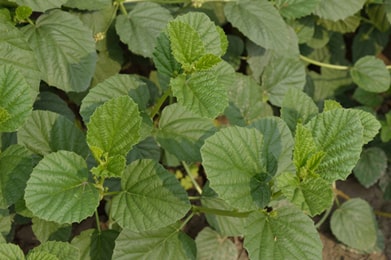Bakuchi (Psoralea corylifolia) - Properties, Benefits, Uses & Dosage

Plant is small, erect and annual herb growing up to 60-120cm high. Seeds of this plant is oblong, flat and brownish black in color. Seeds are kidney shaped with bitter taste and very unpleasant odor. This plant contains simple, rounded and mucronate leaves at apex. Flowers of this plant are yellow and bluish purple colored. Fruits are small about 5mm long and slightly compressed.
General information
Bakuchi is an important herb used in the Indian medicine system from ancient times and still providing various herbal remedies to mankind. This plant is chemo-protective, anti-inflammatory, anti-oxidant and anti-microbial in nature. Most effective feature of this plant is that every part is useful because of its medicinal properties but seeds are most effective to cure various disorders. Seeds of this plant are anti-inflammatory, anti-bacterial, aphrodisiac, astringent, cardiac, cytotoxic, stimulant and diuretic in nature. It is kusthghan means leprosy destroyer. It is used to relieve various problems like leucoderma, skin rash and infections associated with skin. Plant also has blood purifying properties. Roots are used to cure various tooth disorders. Anti-microbial action of fruits is used to destroy disease causing microbes.
This herb contains various chemicals that may include isopsoralen, psoralen, bavachalcone, dehydriopsoralidin, methyl 4- hydroxybenzoate, psoralidin and corylin.
Habitat of the Plant
Bakuchi is widely distributed in the tropical and subtropical regions throughout world. It is native of china and South Africa. In India this plant is easily available in the plains. Especially it is found in semi-arid regions of India like Rajasthan, eastern part of Punjab and Uttar Pradesh. It is also found throughout Himalayan regions.
Classification
- Kingdom - Plantae
- Order - Rosales
- Family – Fabaceae
Names
- Hindi name – Bakuchi
- Sanskrit name – Bvalguja, Bakuchi, Chanderlekha, Chanderprabha, Kusthahantri, Sitavari, Somraji, Krishnaphala.
- Latin name - Posralea corylifolia
- Punjabi name – Babchi
- Gujarati name – Babacha, Babichi
- Urdu name – Babechi
- Assam name – Habucha
- Kannada name – Bavanchi, Bavachige
- Bengali name – Habchu
- Tamil name – Karpokarishi, Karpokarlisi
- Telugu name – Bavanchalu
- Malayalam name – Karkokil, Kaurkolari
- Oriya name – Bakuchi
- Sinhala name – Bodi-ata
- German name – Bawchan
- Bangladesh name – Buckidana
- Arabic name – Loelab- el abid, Mahalep
- Sri Lanka – Ravoli
- Chinese name – Ku-tzu, Cot-chu
Ayurvedic Properties
| Hindi / Sanskrit | English | ||
| Rasa | Katu, Tikta | Taste | Pungent, Bitter |
| Guna | Laghu, Ruksha | Physical Property | Light, Dry |
| Virya | Ushna | Potency | Hot |
| Vipaka | Katu | Metabolic Property (After Digestion) |
Pungent |
Effects on Doshas
It balances vata and kapha dosha.
| Charak Samhita | Sushrut Samhita | Chakradutta | Bhavprakash |
| Tiktasaknda - Herbs with bitter taste | Katu varga - Herbs with pungent taste | Shwitr - Herbs used for shwitr roga | Haritkayadi - Herbs of haritaki group |
Varieties of Bakuchi
According to chikitsa sathan in Shushrut samhita, there are two types of bakuchi:-
- Shweta bakuchi
- Krishna bakuchi
Practical Uses of Posralea corylifolia
- One of the amazing fact about this herb is that whole plant is used in medicine system for its medicinal properties. Common name of this herb is kusthghan, it is best ancient remedy used for kusthroga and leucoderma.
- This plant is natural blood purifier. It is used to boost immune system and process of detoxification of blood.
- It has anti-cancerous, anti-inflammatory, anti-depressant and anti-hyperglycemic properties.
- Seeds of this plant are diuretic, laxative and also used to cure poisoning by scorpion and snake bites.
- It is good to cure dyspnoea, asthma, bronchitis and various disorders associated with respiratory tract.
- It is used to relieve indigestion and also used to cure worm infestation.
- Seeds of this plant are used to cure various skin disorders.
- Fruits of this herb are bitter in taste and used to stop vomiting.
- Seeds of this herb are also used in tooth and bone decalcification.
- Fruits are used to cure anemia, piles and various bleeding disorders.
- It improves hair growth and useful in wound and ulcer healing.
- It is anti-ageing and help to rejuvenate skin.
- It is used to improve quality and luster of hair.
- It is also a cardiac tonic and used to cure various problems associated with cardiac system.
- It improves taste and used to cure anorexia.
- It pacifies vata and kapha dosha.
Caution
Oil of this herb is very strong and excess use of this oil may cause skin discoloration.
Part Used
- Seeds
- Fruits
- Leaves
- Roots
- Flowers
Dosage
- Seed powder – 1-3gm
- Oil – 3-4 drops

